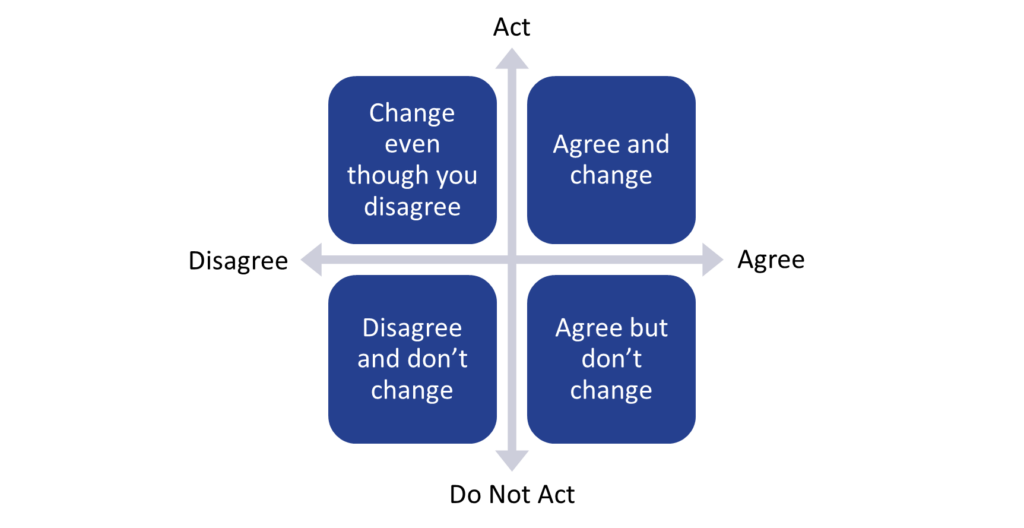The Feedback Loop

By Amy Townson
Earlier this week, I became very excited during separate events involving two of my direct reports. During a routine touchpoint, Brian Mills pointed out that communication and clarity of roles (when talking about the directorship of our department) were lacking. In a Teams chat discussion, Tadd Allar shared that I was cramming too much into a training session.
This seems like an odd thing to be excited about. I mean, who really wants to hear that your work has missed the mark? We all should!
In both instances, the feedback was appropriately delivered. Both gentlemen focused on the behaviors and the outputs rather than taking a personal approach. That’s a critical distinction – I do not feel personal criticisms have any place in our world (business or otherwise!). There are many resources explaining how to offer feedback. Today, though, we’re talking about receiving feedback.
First, why is this feedback, this constructive criticism, so important?
The Benefits
I think there are four key advantages to constructive criticism:
- Encourage a Broader Perspective. Constructive criticism helps us flesh out our thoughts and consider all angles. With every piece of feedback, we are getting a new perspective. Others may see things we’ve overlooked or haven’t fully considered. These are the same benefits we get with healthy debate but on a more individual basis or scope.
- Promote Growth. I firmly believe in continuous improvement – there’s always room to improve, even if you’re already at the “top.” However, knowing where to improve isn’t always obvious. I can look in a mirror and see where I need to lose weight, tone my muscles, or improve my posture. I can’t look in that same mirror and see that I need to improve communication. My colleagues and team members provide that mirror for me.
- Demonstrate and Build Trust. Teams that regularly offer constructive criticism share a bond of trust that is difficult to emulate without open feedback. It’s hard to receive criticism. The receiver needs to trust that their team member really does have their best interests at heart and that the feedback is intended to help. Constructive criticism is a form of honest communication that trusting teams naturally seek… and distrustful teams all too often avoid.
- Spark Action. Constructive criticism frequently spurs us to act to improve our work. Especially if we trust and value the sender, we generally want to improve to live up to their expectations of us.
What Feedback Really Means
Even though it’s rarely spoken, constructive criticism conveys two key messages.
Feedback says, “I care.” I care enough about you to want you to improve. I care enough about you to want to see you succeed. I care enough about our work to produce the best product possible. I care. That’s a pretty powerful message!
Equally powerful is “I believe.” I believe in your ability to be successful. I believe in the importance of the work we are doing together. I believe in the vision we are trying to achieve. I believe.
Pretty compelling stuff, huh?
Taking Feedback to Heart
Getting constructive criticism is good – there are many positive benefits, and the feedback shows that the person cares about you. But what you do next says something to them. I always thank the sender – whether I agree or disagree, I know they are providing feedback from a position of caring and belief in me. Beyond that, though, you have four choices along two spectrums: agreement and action.

There are times that I hear feedback… and I disagree with it. There’s usually an element of truth to the feedback, but I disagree with the need to change as a result. There are times that I hear feedback and completely agree with it. Many years ago, a colleague told me I spoke too much in generalities and big ideas. She was absolutely right! I like to think strategically, figure out the big picture, and then work out the details as we go along.
Whether you agree or disagree with the feedback, you then choose whether to change. I’ve found that change is easier and longer lasting if I agree with the feedback. The analyst I mentioned above was right, but more importantly, she was also correct in another aspect. She was very analytical and needed more details before she could visualize the bigger picture we were shooting for. I wasn’t giving her what she needed, so I tried to change to improve as a result. It’s been over a decade, and I still try to offer more details, although I usually start with a big picture, then catch myself and go back.
Sometimes, it’s easier to change regardless of whether you agree. For example, there have been times that I’ve changed simply because the feedback came from my boss. Did I necessarily agree with it? No, but I liked my job. Unfortunately, none of those changes stuck. Was the feedback correct? Probably, but I’m only human!
All too often, though, I receive feedback and do not act upon it. Maybe I disagree with the feedback, or maybe changing is too hard. I’m frequently told, for example, that I work too much. I need to find hobbies, I need to relax more, and I need to have a better work-life balance. I agree with the folks who cite this as a bad example for my team members – I push others to have a work-life balance, but I don’t lead by example. Unfortunately, I never seem to be able to make that change. I love what I do for a living, and sometimes I just lose track of time because I enjoy the work. (I now offer a caveat to conversations around the work-life balance – if you work too much because you’re having fun, I can’t argue with you!)
Creating a Feedback Culture
I want everyone on my team to feel free to offer their feedback and constructive criticisms – both to myself and to one another. Frequently, though, it’s hard to speak out. Rather than criticize them for not criticizing, I have four strategies I will use to show that I’m serious:
- Ask for their feedback and critique of my work, behaviors, and approach. How can I do better? It’s a simple question, very easy to say. Saying it and meaning it, of course, is more difficult. But, if I ask for their feedback because I genuinely want to do better, folks feel more open to providing it.
- Thank them when they provide this. It seems odd to thank someone for offering feedback. But, since I know they are coming from a position of caring and belief, I know they are trying to help me. Sincerely thanking them is vital.
- Maintain their psychological safety. If I disagree with their feedback, I present my position carefully. Showing team members that it’s safe to speak up encourages them to do so.
- Ask for their help. If I decide to act based on their feedback, I let them know. But I go one step further, and I ask them to help me and hold me accountable. It’s easy to fall into more comfortable patterns, and I might need their help if I regress.
How About You?
We all know how feedback should be delivered. What we do with constructive criticism, though, is just as important. Personally, I find it hard to look in the mirror my colleagues provide. But, since I’ve fostered a team culture where that feedback is truly valued, I know they are coming from a place of caring. They care about me, and they believe in me.
Do you need help creating this environment on your team? Reach out to us – Momentum’s culture focuses on caring, and constructive feedback is a natural offshoot. We can help you achieve the same!
Written by Amy Townson
 Amy is a certified project manager with over 20 years of experience and expertise in the health and human services industry, transportation, state government sector, contract management, and project management techniques. She has successfully managed over fifty unique projects and multiple portfolios of projects. In addition, Amy has provided training for state and federal clients on a variety of topics. She has strong facilitation skills with the ability to tailor messages to fit the audience’s experience level and role. Amy is a skilled leader of in-person, virtual, and combination teams.
Amy is a certified project manager with over 20 years of experience and expertise in the health and human services industry, transportation, state government sector, contract management, and project management techniques. She has successfully managed over fifty unique projects and multiple portfolios of projects. In addition, Amy has provided training for state and federal clients on a variety of topics. She has strong facilitation skills with the ability to tailor messages to fit the audience’s experience level and role. Amy is a skilled leader of in-person, virtual, and combination teams.
Like Amy’s work? Check out some of her other blogs – Wowing Your Clients, The Business Apology, or Are You Preparing for Tomorrow?
 Tap to email
Tap to email
